NyQuil: definition, uses, interaction, and dosage
Table of content
- What is NyQuil?
- What is the other term for NyQuil?
- How common is NyQuil use?
- What is the purpose of NyQuil?
- Who is eligible to take NyQuil?
- What is NyQuil made of?
- What is the health benefit of NyQuil?
- What are the side effects of NyQuil?
- What to know before you take NyQuil?
- What is the best time to take NyQuil?
- How often should I take NyQuil?
- What are the common dosage strengths of NyQuil?
- What is the effect of missing a dose of NyQuil?
- How long does it take for NyQuil to start working?
- What precautions should be taken when using NyQuil?
- Where can you purchase NyQuil?
- What is the difference between NyQuil and Mucinex?
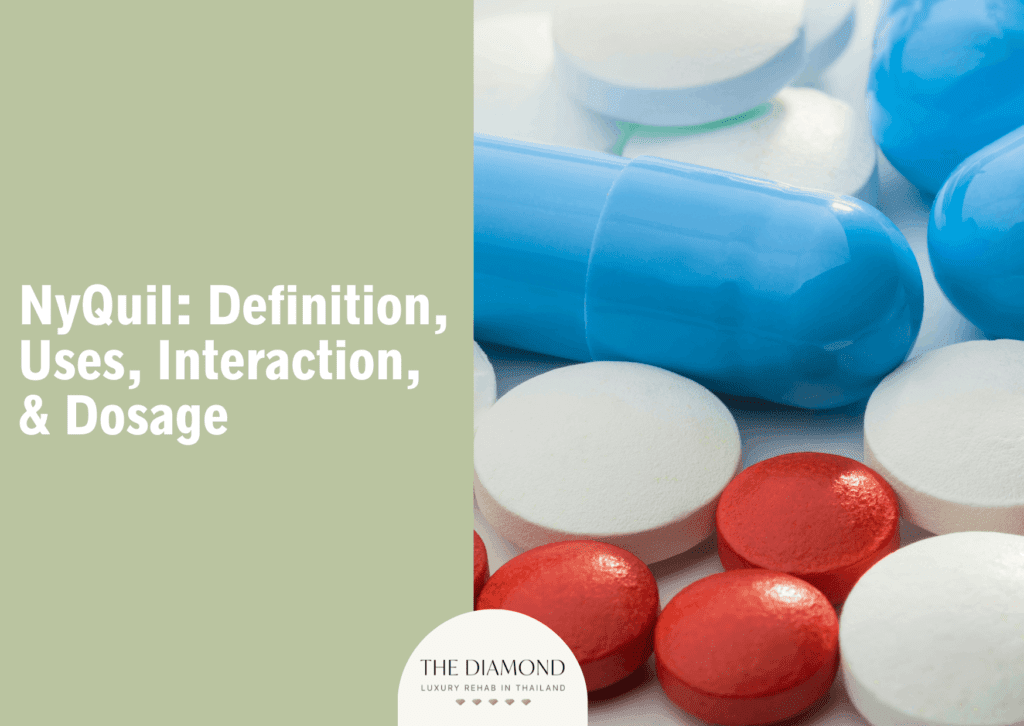
NyQuil is a combination medicine designed to help ease nighttime cold and flu symptoms. It is available over the counter and is usually considered safe and effective for most adults and children over the age of six.
The standard NyQuil dosage for adults in liquid form is 30 mL every 6 hours, while for children aged 6 to 11, it’s 15 mL every 4 or 6 hours. With oral capsules, adults and children over 12 can take 2 pills with water every 6 hours.
The most common side effects of NyQuil include drowsiness, blurry vision, constipation, dizziness, nervousness, nausea, excitability, upset stomach, or dry mouth/nose/throat.
The purpose of NyQuil is to reduce a variety of cold and flu-related symptoms so that people can rest and recover more easily. The combination of active NyQuil ingredients, such as acetaminophen, dextromethorphan (DXM), and doxylamine, targets these symptoms to provide symptomatic relief while the body fights off the underlying viral infection.
What is NyQuil?
NyQuil is a well-known combination medication containing three active ingredients – acetaminophen, dextromethorphan, and doxylamine. It is designed to help you feel better when you have a cold, the flu, or other similar infections that affect your nose, throat, and chest. NyQuil is manufactured by Vicks, a renowned consumer healthcare brand owned by Procter & Gamble.
When you take NyQuil, it can help you briefly feel better by making your coughing, stuffy nose, sneezing, sore throat, headache, and body aches go away. Remember, NyQuil doesn’t cure the illness, but it can make you more comfortable while your body fights it off.
What is the other term for NyQuil?
There is no other term or alternate name specifically for NyQuil. NyQuil is a specific brand name owned by Vicks (Procter & Gamble) for their cold and flu symptom relief medication.
However, there are other over-the-counter medications and generic alternatives that contain similar active ingredients and serve a similar purpose as NyQuil. These generic alternatives may be marketed under various brand names or simply labeled as “cold and flu relief” or “nighttime cold medicine,” among others.
How common is NyQuil use?
Nyquil use is common. In fact, every year, over 95 million packages of over-the-counter cough and cold medications for children and adults are sold in the United States, according to a 2008 article titled, “Doctors want FDA to halt cold medicines for kids,” from Reuters.
Furthermore, an article on NyQuil addiction and abuse published in Addiction Center estimates that NyQuil, DayQuil, and other dextromethorphan-based drugs have been abused by more than 3% of American 12th graders or teenagers in an effort to have fun.
A report by the Substance Abuse and Mental Health Services Administration (SAMHSA) where the agency surveyed almost 45,000 persons aged 12 to 25 states that males abused over-the-counter (non-prescription) cough and cold drugs more than females (1.8 percent vs. 1.3 percent) in the previous year.
About 30% of those who abused cough and cold medicine in the past year used NyQuil, 18% used Coricidin, and 18% used Robitussin.
Elderly people also use NyQuil as an OTC sleep aid. Furthermore, the recommendations of a Gerontological Society of America workgroup on the sleep health and appropriate use of OTC sleep aids in older adults published in 2017 in The Gerontologist indicate that 1.1 million of the 6.3 million older individuals aged 65 and up who reported sleeplessness with insomnia/sleep difficulties utilized an over-the-counter sleep aid. 37% of these respondents reported using OTC sleep aids for 15 days or more in the previous month.
What is the purpose of NyQuil?
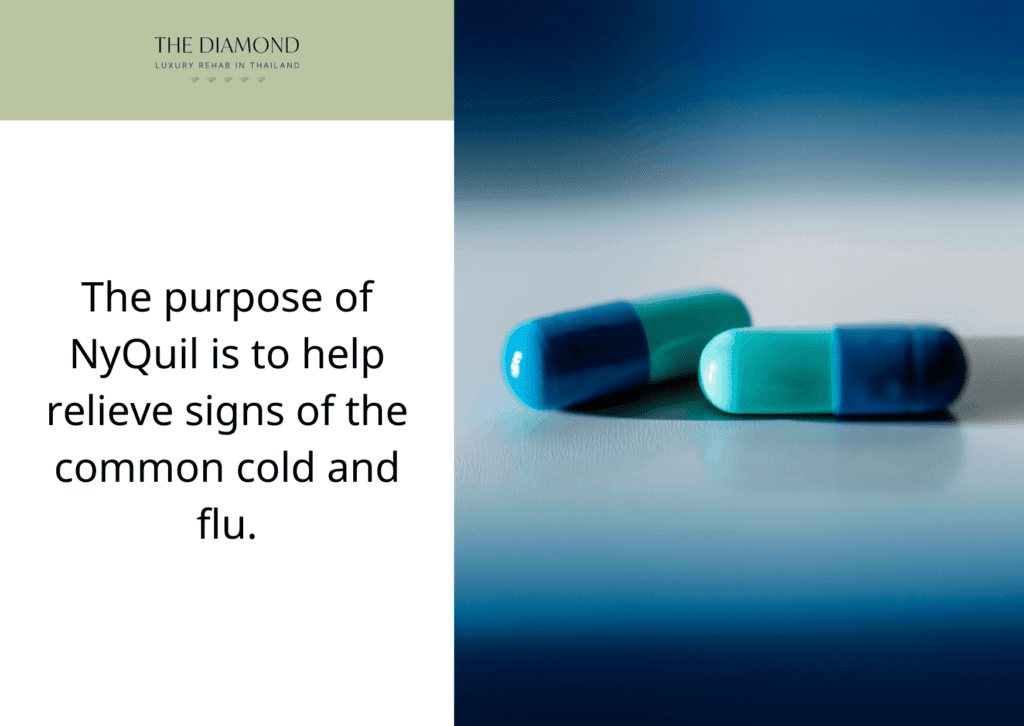
The purpose of NyQuil is to help relieve signs of the common cold and flu. It attempts to ease coughing, sneezing, runny nose, nasal congestion, sore throat, fever, and headaches, among other common symptoms.
NyQuil isn’t meant to cure the sickness that’s causing the symptoms. Instead, it’s meant to temporarily relieve the symptoms so that people can relax and recuperate.
How does NyQuil work in the body?
NyQuil works in the body by affecting different receptors and enzymes that are involved in inflammation, pain, cough, allergy and sleep. This is made possible by NyQuil’s three main active ingredients, namely acetaminophen, dextromethorphan (DXM), and doxylamine.
Acetaminophen relieves pain and lowers fever. It works by inhibiting the generation of particular chemicals in the brain that are involved in pain perception and temperature control. Acetaminophen relieves sore throats, headaches, and minor body pains caused by cold and flu infections by lowering fever and easing pain.
Dextromethorphan is a cough suppressant. It works by acting on the cough center in the brain, reducing the brain’s sensitivity to signals that trigger the urge to cough. This helps to suppress dry, non-productive coughing, allowing individuals to rest more comfortably.
Doxylamine succinate is an antihistamine with sedative properties. By inhibiting histamine, it relieves sneezing, runny nose, and other cold and allergy symptoms. Additionally, its sedative effects can help promote better sleep, as getting restful sleep is crucial for the body’s healing and recovery during illness.
Who is eligible to take NyQuil?
Adults and children aged 12 years and older are eligible to take NyQuil. Kids 6 to 11 years old can also take children’s NyQuil, which is a form of the medication specifically formulated for children ages 6 and older.
NyQuil is generally safe for adults who do not have any underlying health conditions or contraindications with its active ingredients. Some formulations of NyQuil are specifically labeled for children aged 6 and older. Always use pediatric-specific formulations for children, and follow the dosing instructions carefully.
Who is not eligible to take NyQuil?
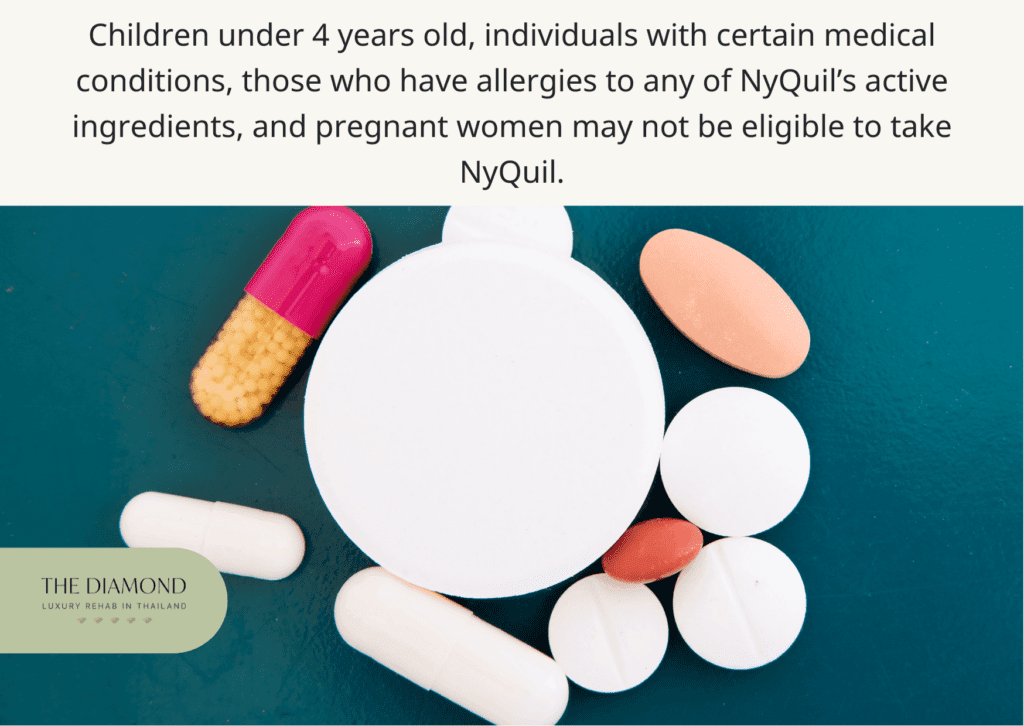
Children under 4 years old, individuals with certain medical conditions, those who have allergies to any of NyQuil’s active ingredients, and pregnant women may not be eligible to take NyQuil.
NyQuil is considered dangerous for children under 4 years old due to the risk of serious side effects. In fact, an article titled, “Children’s Nyquil Liquid – Uses, Side Effects, and More” from WebMD states that the safety or effectiveness of cough-and-cold remedies in children under the age of 6 has not been established.
According to drug information on acetaminophen/dextromethorphan/doxylamine published in GoodRx, before using NyQuil, anyone with a history of or present liver issues, chronic cough, glaucoma, difficulty urinating, a cough that produces mucus, or who is on a sodium-restricted diet should first speak to their doctor because NyQuil can exacerbate their condition.
If someone has known allergies or sensitivities to any of NyQuil’s main components, they should also avoid using the medication.
Finally, a 2022 article titled, “Can you take NyQuil while pregnant?” from Drugs.com states that many NyQuil products have two chemicals that should not be taken during pregnancy: phenylephrine and alcohol (commonly known as ethanol).
Decongestants, such as phenylephrine, may restrict blood flow through the placenta (which provides nourishment and blood to the baby) or cause birth abnormalities. Alcohol has been shown to penetrate the placenta and reach a developing infant.
What is NyQuil made of?
NyQuil is primarily made of its active ingredients, acetaminophen, dextromethorphan, and doxylamine succinate.
Other inactive ingredients include citric acid, alcohol, polyethylene glycol, propylene glycol, sodium citrate, flavor, FD&C Blue No. 1, FD&C Red No. 40, high fructose corn syrup, povidone, purified water, sodium benzoate, saccharin sodium, PEG-40 stearate, and xanthan gum, according to the label of NyQuil cold and flu published in DailyMed.
What is the health benefit of NyQuil?
The health benefit of NyQuil is that it can help you feel better when you have a cold, flu, allergy, or other respiratory illness.
It can offer symptom relief, improved sleep, easier breathing, and reduced discomfort. NyQuil can help reduce coughing, sneezing, runny nose, nasal congestion, sore throat, headache, and minor body aches. By providing relief from these symptoms, it can make individuals feel more comfortable and help them rest better.
NyQuil formulations often contain sedative antihistamines, such as doxylamine succinate, which can promote better sleep. Adequate rest is essential for the body’s healing and recovery during illness.
The decongestant in NyQuil helps reduce nasal congestion and swelling, making it easier for individuals to breathe and improving overall comfort. The pain reliever and fever reducer (typically acetaminophen) in NyQuil can help alleviate sore throat pain, headache, and minor body aches, reducing overall discomfort during illness.
What are the health risks of NyQuil?

The health risks of NyQuil include liver damage, overdose, drowsiness and impaired alertness, allergic reactions, high blood pressure, and birth defects.
NyQuil formulations contain acetaminophen, which can cause liver damage if used in large amounts or mixed with other acetaminophen-containing drugs. Individuals with liver conditions or those who consume alcohol regularly may also be at a higher risk of liver toxicity when taking NyQuil.
Taking more than the recommended dose of NyQuil can lead to an overdose, especially if someone combines multiple medications that contain the same active ingredients. Overdosing on NyQuil can be harmful and may cause serious medical complications.
The medication also contains sedative antihistamines, such as doxylamine, which can cause drowsiness and impair alertness. That said, operating heavy machinery or driving while under the influence of NyQuil can be dangerous.
An article titled, “NyQuil Liquid – Uses, Side Effects, and More” from WebMD adds that in certain persons who are allergic to its chemicals, NyQuil might cause a rash, itching, swelling, difficulty breathing, or anaphylaxis.
Blood pressure can be raised by NyQuil formulations containing decongestants such as phenylephrine or pseudoephedrine. People with hypertension or cardiac issues should exercise caution when using NyQuil decongestant medicines.
Moreover, according to a 2022 article titled, “What Cold Medicine Can I Take While Pregnant?” from Verywell Family, any cold treatment that contains alcohol, including Nyquil, should be avoided while pregnant unless prescribed by a doctor.
What are the side effects of NyQuil?
Common side effects of NyQuil may include drowsiness, dizziness, blurred vision, dry mouth, and constipation. The ingredient doxylamine contained in NyQuil can cause drowsiness and impair alertness, leading to reduced concentration and coordination.
Some individuals may experience an upset stomach or other gastrointestinal discomfort due to the combination of active ingredients. Severe adverse effects are uncommon, although they do occur. These include allergic responses, inability to urinate, irregular pulse, and extreme dizziness.
Seek emergency medical assistance for severe or persistent side effects or allergic reactions like rash, itching, swelling, severe dizziness, or difficulties breathing.
Does NyQuil cause drowsiness?
Yes, NyQuil causes drowsiness. This is because it contains two ingredients that can make you feel sleepy: doxylamine succinate and dextromethorphan.
A 2023 article titled, “Taking NyQuil for Sleep” from The Recovery Village states that because doxylamine succinate does not distinguish between which histamine receptors it blocks, it crosses the blood-brain barrier and inhibits receptors involved in sleep regulation. Drowsiness occurs from the interruption of this specific function of histamines in the brain.
On the other hand, dextromethorphan causes drowsiness due to the inhibition of message transmitters in the nervous system.
What to know before you take NyQuil?

Some important things to know before taking NyQuil include the presence of certain medical conditions, allergies, drug interactions, and unsuitability to certain populations – all of which should be taken in consideration to find out whether NyQuil is right for you and your symptoms.
If you have problems with your liver, kidney, high blood pressure, heart, glaucoma, thyroid, or urination, tell your doctor or pharmacist. These medical conditions may require special consideration or make the use of NyQuil inadvisable.
It is also crucial to check the ingredients list to ensure you are not allergic to any of the active or inactive ingredients in NyQuil. If you have known allergies to any components, avoid using the product.
Discuss with your healthcare practitioner any prescription medications, over-the-counter drugs, or herbal supplements you are using. Some medications can interact with NyQuil, leading to potential side effects or reduced effectiveness.
The medicine may not be suitable for certain populations. Children under the age of 4 are not advised to take NyQuil owing to the possibility of major adverse effects. Pregnant and breastfeeding individuals should also consult a healthcare professional before using NyQuil to ensure its safety during pregnancy or while nursing.
How to take NyQuil?
When taking NyQuil, it’s essential to follow the dosing instructions provided on the product’s packaging. Below are general instructions on how to take NyQuil.
- Take NyQuil orally with or without meals: This medicine is to be taken by mouth every 4 to 6 hours, with or without meal, unless otherwise prescribed by your doctor. Take NyQuil with food or milk if stomach upset occurs.
- Take with plenty of water: Unless otherwise ordered by your doctor, drink plenty of fluids while taking this drug. The fluid will aid in the breakdown of mucus in your lungs.
- Measure the dose: Use the provided measuring cup or device to measure the correct dose of liquid NyQuil. Do not use household spoons, as they may not provide accurate measurements.
- Do not exceed the recommended dose: An article titled, “Vicks NyQuil – Uses, Side Effects, and More” from WebMD states that the dosage is determined by your age, medical condition, and treatment response. Do not increase the dose, frequency, or duration. Misuse (abuse) of NyQuil may result in severe harm (including brain damage, seizures, and even death).
- Duration of use: Use NyQuil for the shortest duration necessary to provide relief from symptoms. If symptoms persist, worsen, or if you have specific health concerns, consult a healthcare professional.
Can NyQuil be used as treatment for addiction?
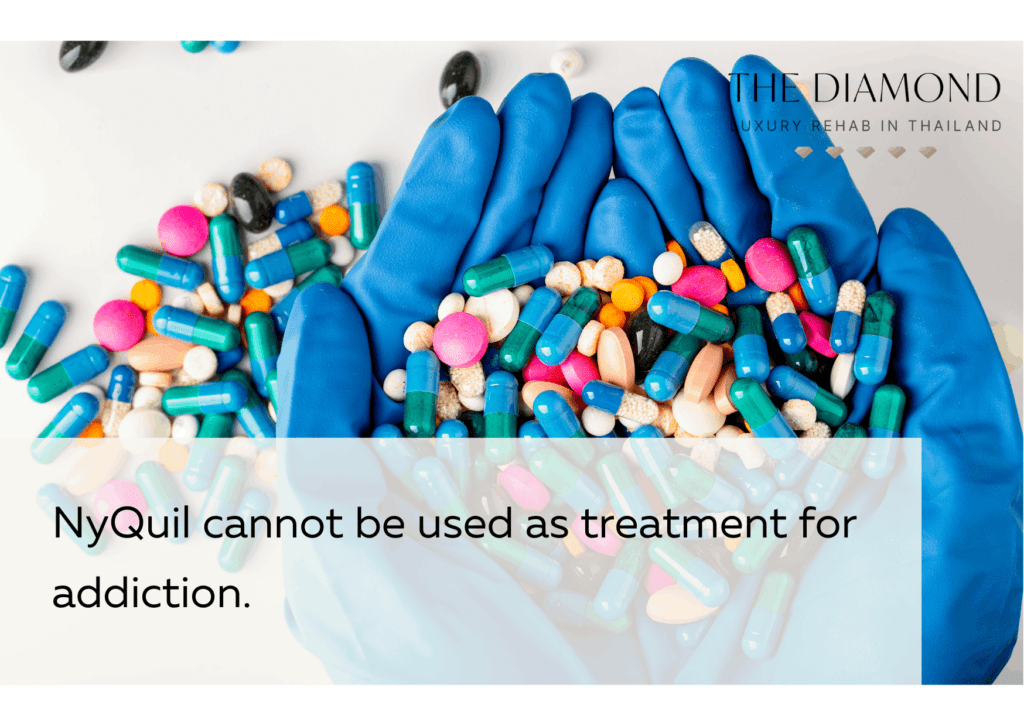
No, NyQuil cannot be used as treatment for addiction. NyQuil treats short-term cold and flu symptoms, but not persistent health issues like addiction.
To understand the difference, it is important to know what addiction is. Addiction is a complex medical condition that requires specific treatment approaches and professional support. Treatment for addiction typically involves evidence-based therapies, counseling, support groups, and sometimes medications prescribed by healthcare professionals, depending on the substance of addiction.
What is the best time to take NyQuil?
The best time to take NyQuil depends on the formulation and your specific needs. When used for cold and flu relief, NyQuil is most effectively taken 30 minutes prior to bedtime.
This allows the medication to take effect and provides relief from symptoms while you sleep. It is worth noting, however, that NyQuil should not be used as a sleep aid. A 2022 article titled, “What Pharmacists Say About How Long It Takes NyQuil to Work (Plus 4 More Tips)” from GoodRx Health also warns that even though it can also be consumed at any time of day, you should be aware that Nyquil may make you feel sleepy. If it makes you feel excessively tired, you might need to avoid using it throughout the day.
A 2023 article about taking NyQuil for sleep published in The Recovery Village asserts that even though it has ingredients like doxylamine that are often given to help people sleep, it is not a good idea to depend on NyQuil to help you sleep.
This is because in addition to doxylamine, NyQuil has other components like alcohol that shouldn’t be used to sleep.
How often should I take NyQuil?
It is recommended that you take NyQuil every 4 to 6 hours as needed for symptom relief, but not more than four doses in 24 hours. The effects of NyQuil can last for about 6 hours, but the drowsiness may last longer.
Still, it’s important to remember that the frequency of taking NyQuil should adhere to the dosing instructions provided on the product’s packaging or as directed by a healthcare professional.
What are the common dosage strengths of NyQuil?
The common dosage strengths of NyQuil are 325 mg of acetaminophen, 15 mg of dextromethorphan, and 6.25 mg of doxylamine in each 15 mL of liquid for NyQuil Cold and Flu, according to a 2023 article on Nyquil dosages for adults from GoodRx Health.
The product NyQuil Sinus LiquiCaps contains 325 mg of acetaminophen, 5 mg of phenylephrine, and 6.25 mg of doxylamine in each liquid capsule. Finally, NyQuil Severe Honey Cold and Flu has 325 mg of acetaminophen, 10 mg of dextromethorphan, 6.25 mg of doxylamine, and 5 mg of phenylephrine in each 15 mL of liquid.
The typical oral liquid NyQuil dosage for adults is 30 mL (2 tablespoons) taken orally every 6 hours. For kids 6 to 11 years old, the recommended dose is 15 mL orally every 4 or 6 hours. On the other hand, when taking oral capsules, the suggested NyQuil dose for adults and children over 12 years old is 2 pills taken with water every 6 hours.
What is the effect of missing a dose of NyQuil?

Missing a dose of NyQuil is not usually a problem, as this medicine is used when needed for cold and flu symptoms. However, if you are taking NyQuil regularly or on a schedule, you should take the missed dose as soon as you remember it, if you still require it for symptom relief.
Do not double up to compensate for a missing dose, as this can exacerbate negative effects or cause overdose. The same goes for taking a dose of NyQuil too close to the time you’re supposed to take it again; doing so can lead to dangerously high concentrations of the drug in your system.
How long does it take for NyQuil to start working?
NyQuil starts working within 30 minutes after you take it. However, the time it requires to take effect may also depend on the individual, the dose form (liquid or capsule), and whether it is taken with or without food.
In fact, according to a 2019 article titled, “How Fast Does NyQuil Work?” from Walrus, liquids are absorbed faster than capsules, and taking NyQuil on an empty stomach may speed up its effects.
What precautions should be taken when using NyQuil?
Precautions that should be taken when using NyQuil include abstaining from drinking or using other sedatives, engaging in tasks that require alertness, using more NyQuil or than directed or for longer than recommended, and avoiding the recent use of an MAO inhibitor.
When taking NyQuil, it’s essential to avoid consuming alcohol or using other sedatives simultaneously. NyQuil itself contains certain active ingredients, such as antihistamines, which can cause drowsiness and reduce alertness as a side effect.
Combining NyQuil with alcohol or other sedatives can compound these effects, intensifying drowsiness and further impairing alertness. It is also crucial to follow the recommended dosage and dosing intervals as indicated on the product’s packaging.
Do not exceed the recommended dose or take NyQuil more frequently than directed. The Vicks NyQuil FAQ on the manufacturer’s website asserts that taking too much of the medication can cause serious side effects or overdose, such as liver damage, seizures, heart problems, or coma.
Antidepressant medications called monoamine oxidase inhibitors (MAOIs) are used to treat conditions like Parkinson’s disease and depression. They can cause a dangerous interaction with NyQuil that can raise your blood pressure and cause a headache, nausea, vomiting, or even death.
Is it safe to consume alcohol while taking NyQuil?
No, it is not safe to consume alcohol while taking NyQuil. NyQuil has active ingredients like dextromethorphan and antihistamines, which can make you sleepy and less alert.
When taken with alcohol, another central nervous system depressant, the effects might be amplified, resulting in severe sleepiness and decreased cognitive performance.
To ensure your safety and avoid potential adverse effects, it is essential to avoid alcohol consumption while taking NyQuil or any other medication that contains similar active ingredients.
Is it possible to get addicted to NyQuil if you use it frequently?

Yes, it is possible to get addicted to NyQuil if you use it frequently. This is especially true if you misuse it for purposes other than treating cold or flu symptoms. NyQuil contains dextromethorphan (DXM), a cough suppressant that can cause a sensation similar to being drunk and hallucinations in high doses.
Some people misuse NyQuil by taking it to fall asleep or by using it as a recreational drug. NyQuil addiction can be dangerous and harmful to your physical and mental health. It can hurt the liver, cause seizures, put you into a coma, or even lead to death in the worst cases. Additionally, it can affect your mood, memory, cognition, and behavior.
What should I refrain from while taking NyQuil?
While taking NyQuil, you should refrain from drinking alcohol, taking other sedatives, driving and operating machinery, and engaging in extended use of the medication.
It’s best to avoid alcohol while using NyQuil to stay safe and avoid any unwanted side effects. If you take them together, it can make you extremely sleepy and impact your ability to think clearly.
Avoid using NyQuil with other drugs that contain acetaminophen, dextromethorphan, or doxylamine to avoid overdose or other negative consequences. The medicine can also cause drowsiness and alter coordination. Refrain from driving or operating heavy machinery after taking NyQuil, especially if you are sensitive to its sedative effects.
Most importantly, NyQuil is intended for short-term use to provide relief from cold and flu symptoms. It is best to refrain from using it for an extended period without medical supervision.
Where can you purchase NyQuil?
You can purchase NyQuil at most pharmacies, grocery stores, or online merchants that sell over-the-counter medicines. NyQuil is a brand of cold and flu medication that relieves symptoms including congestion, runny nose, sneezing, sore throat, and fever.
It comes in different forms, such as liquid, LiquiCaps, or severe cold and flu formula. In addition, NyQuil is sold over-the-counter (OTC), which means you can buy it without needing a prescription from a healthcare professional.
How long is NyQuil typically prescribed for?
NyQuil is typically prescribed for short-term use, according to drug information on acetaminophen/dextromethorphan/doxylamine from GoodRx. If your sore throat lasts more than 2 days, cough lasts 7 days or returns, or fever lasts more than 3 days, stop using this medication and talk to your doctor. These might be symptoms of an illness that NyQuil Cold and Flu can’t treat.
NyQuil is not typically prescribed by healthcare professionals. It is accessible without a doctor’s prescription because it is an OTC drug.
What is the difference between NyQuil and Mucinex?
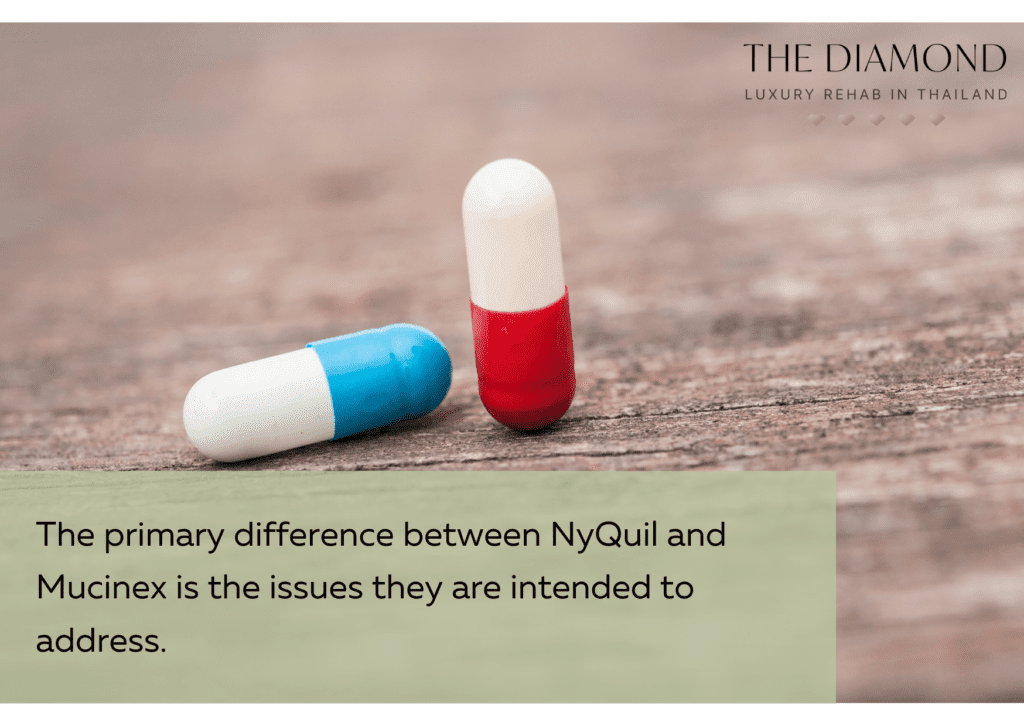
The primary difference between NyQuil and Mucinex is the issues they are intended to address. NyQuil is aimed at managing a broader range of cold and flu symptoms, such as cough, nasal congestion, and headache, whereas Mucinex is designed to relieve chest congestion and aid in productive coughing by thinning mucus in the airways.
When comparing Mucinex vs. NyQuil, it is also essential to talk about the two medications’ active ingredients. The active components in NyQuil are a mix of different chemicals, including the analgesic acetaminophen, the cough suppressant dextromethorphan, and the sedative antihistamine doxylamine succinate.
On the other hand, an article titled, “What Is The Difference Between Mucinex And NyQuil?” from HelloPharmacist.com states that Mucinex only has one active ingredient, an expectorant called guaifenesin. It helps to thin and loosen mucus in the chest and throat, making it easier to cough up.

